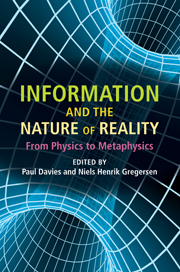Book contents
- Frontmatter
- Contents
- About the authors
- Acknowledgments
- 1 Introduction: does information matter?
- Part I History
- Part II Physics
- Part III Biology
- Part IV Philosophy and Theology
- 12 The sciences of complexity: a new theological resource?
- 13 God as the ultimate informational principle
- 14 Information, theology, and the universe
- 15 God, matter, and information: towards a Stoicizing Logos Christology
- 16 What is the ‘spiritual body’? On what may be regarded as ‘ultimate’ in the interrelation between God, matter, and information
- Index
- References
13 - God as the ultimate informational principle
from Part IV - Philosophy and Theology
Published online by Cambridge University Press: 06 December 2010
- Frontmatter
- Contents
- About the authors
- Acknowledgments
- 1 Introduction: does information matter?
- Part I History
- Part II Physics
- Part III Biology
- Part IV Philosophy and Theology
- 12 The sciences of complexity: a new theological resource?
- 13 God as the ultimate informational principle
- 14 Information, theology, and the universe
- 15 God, matter, and information: towards a Stoicizing Logos Christology
- 16 What is the ‘spiritual body’? On what may be regarded as ‘ultimate’ in the interrelation between God, matter, and information
- Index
- References
Summary
Scientists who speculate on philosophical questions usually agree that classical materialism – the view that reality consists of nothing but small massy particles bumping into one another in an absolute and unique space–time – is intellectually dead. Accounts of the universe now regularly involve notions such as that of manifold space–times, quantum realities that exist at a more ultimate level than, and are very different from, massy particles in one specific space, and informational codes that contain instructions for building complex integrated structures displaying new sorts of emergent property.
What this suggests is that the nature of the reality investigated by physics and biology is much more complex and mysterious than some Newtonian materialists thought (though of course Newton himself was as far from being a materialist as one can get). In particular, the role of information in any account of our universe has come to take on a new importance.
Most contributors to this volume distinguish three main types of information – Shannon information, “shaping” information, and semantic information.
Shannon information is a matter of how to input the maximum amount of information into a closed physical system. It is concerned, it might be said, with quantity rather than quality, in that it totally ignores questions of the significance or function of the information that a physical system might contain. This is a technical matter for information technologists, and I shall not consider it further.
- Type
- Chapter
- Information
- Information and the Nature of RealityFrom Physics to Metaphysics, pp. 282 - 300Publisher: Cambridge University PressPrint publication year: 2010
References
- 1
- Cited by

